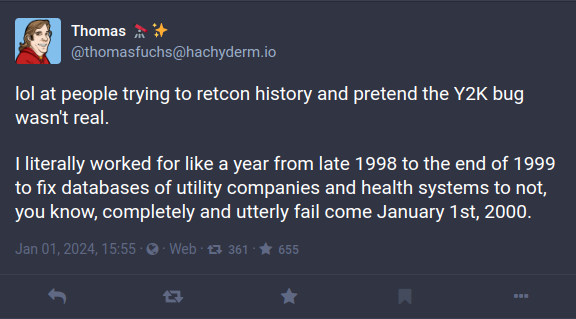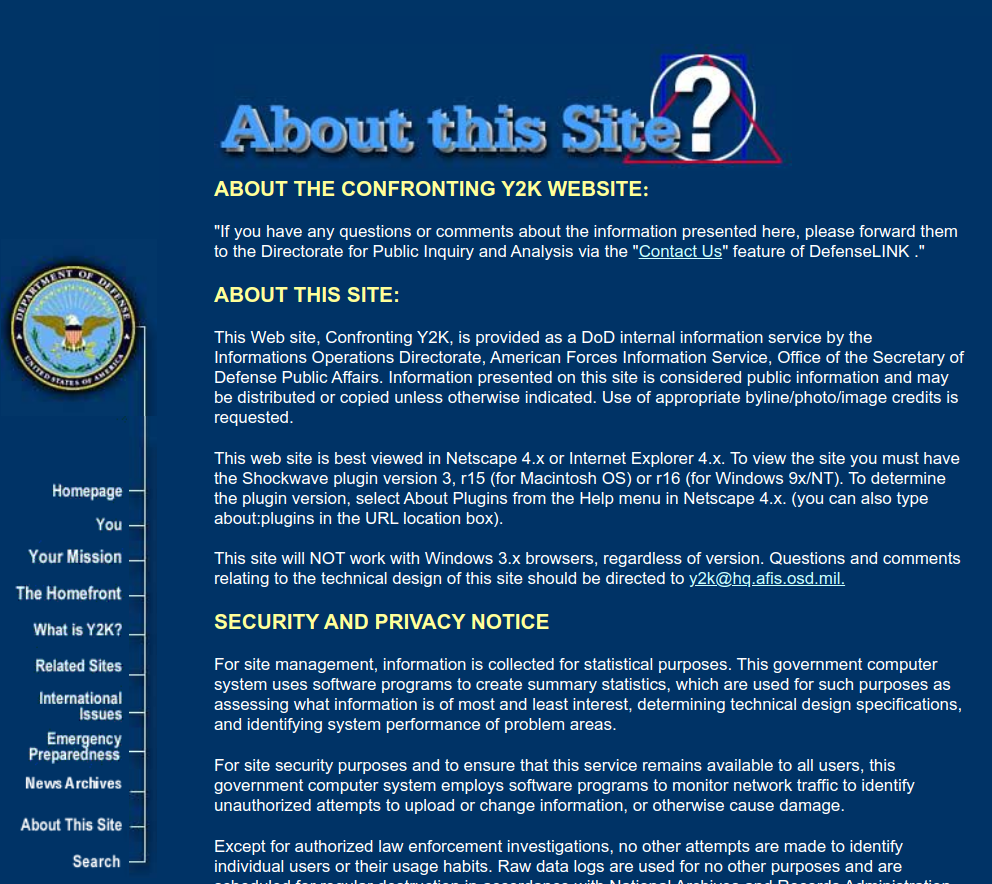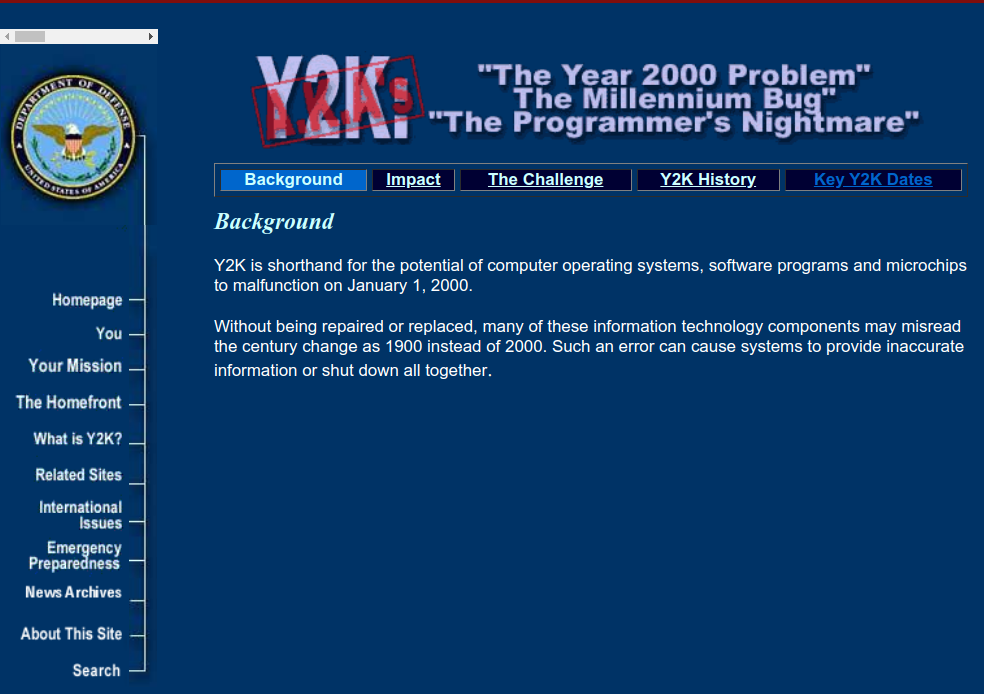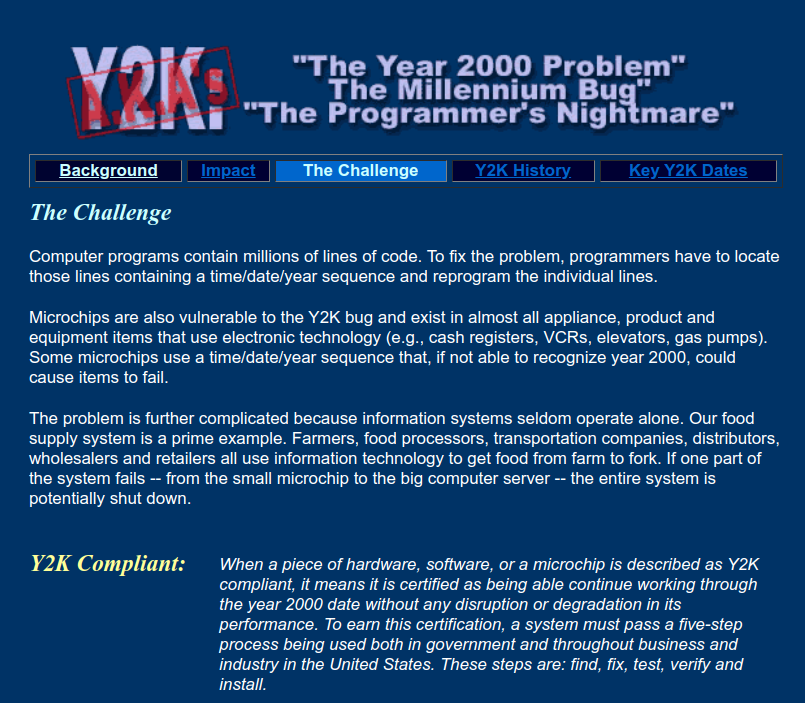Confronting Y2K: The Forgotten war against the infamous computer bug

Its leap day (making this an excuse to publish this blogpost), which means some systems with refuse to work, and I think makes it more than an appropriate time to talk about the New Years Disaster that could’ve been.
More and more, every year, You hear a growing narrative from younger individuals, whom I am a part of, who weren’t alive or weren’t in tech spaces at the time, where they largely disregard the threat that was y2k. Thomas from hachyderm.io said the following thing which led to me actually making this blogpost:

It reminded me of something I remembered from browsing the wayback machine. An archive of the Department Of Defense (cough cough) website which was a valuable source of information leading up to years about proactive and preventative measures to take towards minimizing the potential impacts of Y2K.

I think it would be both interesting, funny, and appropriate to retrospectively browse this website with hindsight in mind to see how well this operation was towards preventing a potentially destructive bug, and maybe we’ll come out of it more understanding and appreciation for the hard work that prevented doomsday.
ABOUT THE CONFRONTING Y2K WEBSITE:
The first site I browsed to trying to get information was the About Me page. Outside of browser compatibility information which dates the creation of the website to 1997, there isn’t anything of real note.
The email address dedicated to the technical design of the site is defunct, and the site functions more as a warning about the collection of data than it exists as an “About Me”

Overall, A very minimal site with not a lot of information, the year of creation is something to take of note, as this site was made 2 years before 1999.
What is Y2K?
the page “What is Y2K” is 5 sections divided into their own sub pages, being Background, Impact, The Challenge, Y2K History, and Key Y2K Dates.
Like the Confronting Y2K website, I’m gonna be talking about them under the same category.

Background
The Background webpage gives an overview about Y2K which falls in line with the modern census accurately. It describes it as such:
Y2K is shorthand for the potential of computer operating systems, software programs and microchips to malfunction on January 1, 2000.
Without being repaired or replaced, many of these information technology components may misread the century change as 1900 instead of 2000. Such an error can cause systems to provide inaccurate information or shut down all together.
Impact
The site labeled Impact outlines a short list of potential harm that could fall due to Y2K, the infrastructure they outlined are very critical systems for modern human life, including food supplies, water, power, and health care. Alongside this information, they outlined how Y2K could be potentially harmful for national security, for over 1.5 million computers and 28,000 computer systems could be impacted by an unfixed Y2K bug.

Honestly, They do an excellent job on not overselling the potential impacts, while not underselling it entirely either. It isn’t “WE’RE ALL GONNA DIE” levels of urgency, but it’s more like “Yeah we’d be kinda fucked if we don’t do anything about it”, kind of a dramatic contrast between how Y2K was seen in the media.
The Challenge
The Challenge is a page about the potential hardships that can come from addressing this issue, and certification on what it means to properly and fully address the issue.
This is largely where I think it gets a little bit juicy, As a younger individual in tech, I always kind of assumed that “Y2K compliance” was a self described award, but reading this page helps me come to the understanding that Y2K compliance was an actual award ratified by a central governing body given to hardware, software, and microchips.

The requirements to reach Y2K compliance is reported as such:
Y2K Compliant:
When a piece of hardware, software, or a microchip is described as Y2K compliant, it means it is certified as being able continue working through the year 2000 date without any disruption or degradation in its performance. To earn this certification, a system must pass a five-step process being used both in government and throughout business and industry in the United States. These steps are: find, fix, test, verify and install.
I find this very interesting, as an individual who believed that Y2K compliance simply became a buzzword used by corporations to sell snakeoil alternatives, claiming they’re better by bandwagoning off of hysteria.
While I don’t necessarily disagree with the motion that snakeoil was sold under the claim of being Y2K compliant, it’s a little bit interesting to know that the term originates with legitimacy.
Y2K History
I don’t think I could really give any important information, outside of linking the page alongside an image of the post, for it gives additional context as to the creation of Confronting Y2K.
 Probably the funniest section has to be the uncertainty in the last sentence.
Probably the funniest section has to be the uncertainty in the last sentence.
January 1, 2000 -- All systems go?
Copyright 2024. All rights reserved.